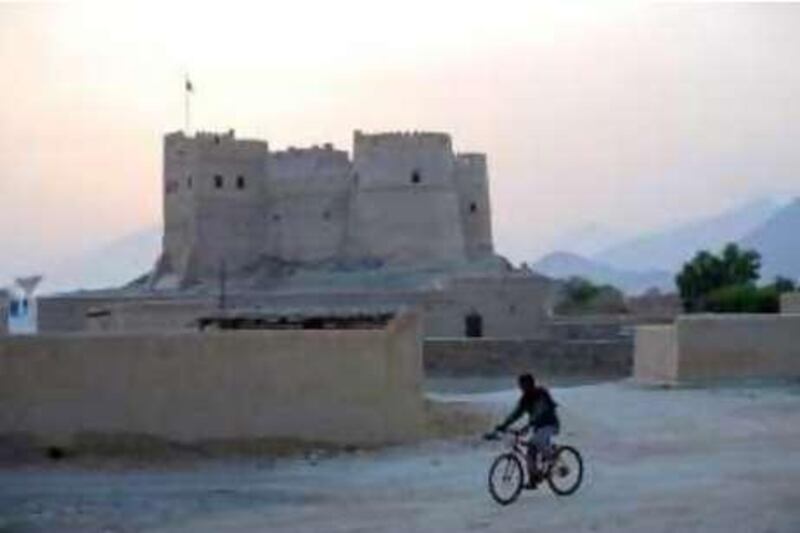As neighbouring emirates transform what was once desert hinterland into bustling metropolises, Fujairah has reached a crossroads. With its beautiful terrain and easy-going, tradition-minded residents, the emirate so far has been spared some of the side effects of rapid economic growth that have afflicted other parts of the country. Yet now is the time to push for modernisation, says Saif al Afham, the general manager of Fujairah Municipality. The difficult task is doing it while preserving the emirate's charm and protecting its cultural identity.
"Everybody wants to be like Dubai, but in Fujairah we don't," says Mr Afham, 39. "We are trying to improve but not make it too crowded for people. We need a development plan that is realistic for our needs, but also unique to fit the character of our people." His solution requires a balancing act: almost doubling the population in less than a decade, promoting industry and tourism while protecting the environment, and managing people's concern about abrupt cultural change.
On a recent workday, The National followed Mr Afham as he spoke with dozens of people who crowded outside his office, which is modelled after a traditional majlis, with black couches arranged in front of his desk. The municipal building has been fitted with kiosks to which residents can go with their questions and problems, but Mr Afham still makes himself available for face-to-face meetings. As he walked the municipality corridors, he individually greeted and listened to the people who gathered at his side.
"Mudir!" - Boss! - several people shouted as Mr Afham walked past a line of labourers. Getting from his office to the car park can take an hour, he says. "We're a small community here. We all know each other," says Mr Afham, the father of four daughters. "People know your family, and they come up to you like they're your neighbour. "Sometimes if people come to my office, I listen to their concerns and consult them. Then I tell them about how the customer-care systems downstairs can help them. I tell them they don't always need to come straight to me, but I'm here if they need me."
Mr Afham, originally from the coastal town of Dibba and an electrical-engineering graduate of the University of Arkansas at Little Rock in the US, was promoted from deputy to general manager of the municipality in June after a series of problems dogged his predecessor, Rashid Hamdan. Dozens of rock quarries that scar the nearby Hajjar Mountains emit choking dust that doctors have blamed for the high rate of respiratory problems among residents. Oil slicks from ships blanket beaches and have caused significant damage to marine life and the hotel industry.
In September, Mr Afham began periodically closing rock quarries to reduce pollution. He has proposed building an alternative route for lorries to minimise dust on roads and ease traffic congestion. He is considering different ways to meet energy needs, such as using solid waste to produce electricity. Last month, he became the first Fujairah official to fine a vessel for illegally dumping oil into the emirate's waters.
Mr Afham envisions a Fujairah that would attract tourists and promote industries such as shipping. "If you look at Fujairah, with its mountains and its proximity to the ocean, it looks like Nice or Cannes," he says. "It's a tourist place, so we have to work on this path. And we have access to the Indian Ocean, so this gives us other options like using our port." Yet he is sceptical of grandiosity: "We need realistic solutions here." His plan includes relatively small projects that will bring in visitors and businesses without the congestion like that in Dubai and Sharjah.
One example is Al Hilal City, a residential and business development next to the Port of Fujairah that will include 20- and 30-storey towers, shopping malls and movie theatres. Although it will add 70,000 to the emirate's population of 100,000, it will be significantly smaller than Al Raha Beach in Abu Dhabi or the Palm Islands, which are expected to increase Dubai's population by more than a million.
With the completion of the Dubai-Fujairah motorway in 2010, Mr Afham believes Al Hilal City could be an alternative for people who want to work in Dubai but live in scenic Fujairah. "Once the road is complete, people can leave their homes here and be at work in Dubai in 45 minutes," says Mr Afham, standing over a model of Al Hilal City, which is expected to be finished within seven years. Mr Afham and other officials are trying to decide whether to line city streets with 40-storey high-rise buildings or smaller ones that might better blend in with mountains and beaches.
"The problem with high-rises is that you feel enclosed," he says, pointing to a few that have already been built. "You want to see the beauty around you." Mr Afham hopes that more cultural events and a planned media zone, called Creative City, will draw a cosmopolitan mix. But such projects will change the lifestyles of Fujairah's residents, which he acknowledges might offend more traditional elements of society. There is rising concern that Emiratis are losing their identity as more foreign nationals and customs come into the country. Already a number of foreign families have moved to Fujairah to work at the airport or shipping industry, their children speaking English at school and play.
"Change is happening whether we like it or not. The problem is that a lot of people think they can hold on to their cultural and societal beliefs and still become modern. This is very hard. "But some forms of change are good and we can embrace them." hnaylor@thenational.ae






